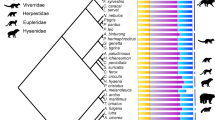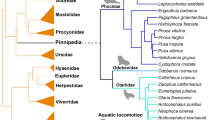Abstract
IN Vertebrata we generally find three forms of vertebræ, namely, proçlous, ophisthoçlous and amphiçlous. In the case of fishes, we get exclusively the amphiçlous form. In birds and mammals the vertebræ approach more nearly to the amphiçlous form than to other types. In the case of Amphibia and Reptilia we get all the three forms in different species, and in the latter class sometimes we get all the three forms even in one individual. The importance of the question is self-evident, as different forms of vertebræ furnish characters diagnostic and useful for classification.
This is a preview of subscription content, access via your institution
Access options
Subscribe to this journal
Receive 51 print issues and online access
$199.00 per year
only $3.90 per issue
Buy this article
- Purchase on Springer Link
- Instant access to full article PDF
Prices may be subject to local taxes which are calculated during checkout
Similar content being viewed by others
References
Phil Trans. Roy. Soc., B, 187, 1; 1896.
Phil. Trans. Roy. Soc., B, 218, 415; 1930.
Phil. Trans. Roy. Soc., B, 219, 165; 1931.
NATURE, 127, 705, May 9, 1931.
Current Science, 342–343, March 1934.
Author information
Authors and Affiliations
Rights and permissions
About this article
Cite this article
MOOKERJEE, H. Causes of Formation of Different Forms of Vertebræ. Nature 134, 182–183 (1934). https://doi.org/10.1038/134182c0
Issue Date:
DOI: https://doi.org/10.1038/134182c0
Comments
By submitting a comment you agree to abide by our Terms and Community Guidelines. If you find something abusive or that does not comply with our terms or guidelines please flag it as inappropriate.



